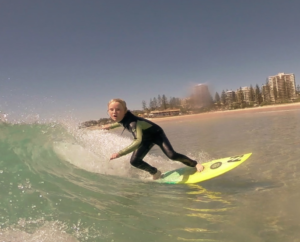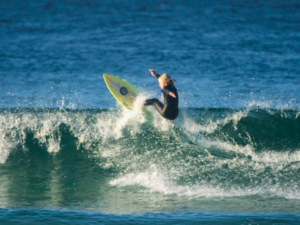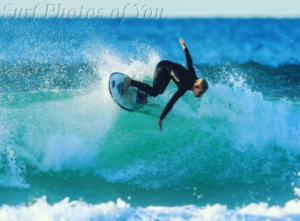
Caleb, the sweetest wave-sharer I know
With more froth than your arvo pint, we dissect what could be your biggest surfing challenge.
It was my lowest point in surfing. Straddling my board with not one, but two middle fingers raised, a whispered f-bomb dropped from my mouth. I lowered my arms and hung my head in absolute shame. That is no way to behave to a fellow surfer. Especially when they’re 12 years old.
But the end of my tether had been reached, all tattered and torn in bitter frustration. The ability to enjoy my daily surf had been continuously stifled by the little black dots buzzing around me like mosquitos. Zipping to my inside, dropping in, or swinging around mid-paddle out and snagging their 11th ride to my none. The Michael Douglas Falling Down moment I played out in my mind had me screaming over the sound of the ocean, asking if anyone had a can of the reddest paint possible to slather me in. If I was going to get treated like a priority buoy, then I may as well look like one.
A few days later, when I was once again in the lineup at my local, patiently waiting for my turn that never seemed to come, my friend paddled over then sat upright. “That’s my nemesis,” she said with a smirk. I followed her gaze and looked over my shoulder expecting to see a boisterous local puffing his chest. Instead, I saw a young boy dropping into yet another great ride. And beyond him, were other fully-grown adults with teeth clenched at their waveless existence. That’s when I realised it was time. Time for my quest to tap into the psyche of the greedy grom.
And beyond him, were other fully-grown adults with teeth clenched at their waveless existence
“There’s sound research that reports society is becoming more ‘me’ focused, with higher rates of narcissistic traits as compared to 30 years ago,” says Libby Purcell, a surfer, mum to two young surf-rats and child psychologist from Old Bar, NSW. “This goes some way to explaining the frothing grom phenomenon, where only their own perspective exists,” Libby says.
Finn Cox, 19, can attest to that. “I’d surf with a bunch of mates, just out the front, and we’d send people in—like, adults—even though we were only 12,” says the Margaret River local who was crowned Western Australia’s 2019 U18 state champ.
While you’ve gotta give Finn and his mates props for their bravado, that Finn explains was borne from their exposure to Hawaiian localism in the surf media, Libby says we need to watch for the warning signs. “Narcissistic traits also means there is little empathy and no sense of guilt, combined with a huge need for admiration,” she says.
It’s no real surprise that our core beliefs are shaped during our early learning years, and Libby points out there’s been a huge shift in how children now interact with each other. “Many years ago, the ’70s and ’80s, kids played unsupervised. This meant that adults weren’t there to intervene when things went wrong. Kids had to sort it out by themselves—sharing, turn-taking, and fairness had to operate in order for kids’ play to continue,” Libby says. “A big part of play is the development of empathy. And empathy is what stops people from becoming narcissistic.”
Narcissistic traits also means there is little empathy and no sense of guilt
Finn does admit that since his micro-grom days, he’s probably changed for the better. “I was pretty bad back then. I just hassled everyone—would go everything.” Now, he’s selectively brutal when it comes to wave sharing. “I let the local crew go cos I know they’ve been waiting. But if it’s just some random dude … I’m not going to let someone who’s crap get the best waves.”
Ooof, this hits hard. Should our surfing ability dictate our right to an equal wave quota? If someone has the skills to paddle in and pop to their feet, should what they do once on the wave really matter? We all thrive on the thrill of the ride, whether we’re wiggling down the face in a poo-man stance or stylishly smacking it top to bottom. Finn supports his argument by likening it to being at the skatepark. “Say I’m crap at skating; I’d let all the good skaters go before me, because you just wanna see what they’re doing and respect them. You know how annoying it would be for someone to get in their way,” he says.
So, we ask Matt Grainger, owner of Manly Surf School/Surfer’s Gym and coach to boardriders of all abilities, whether the lineup is simply fair game for those young sponsored surfers with superior abilities. “Everyone should share the lineup. I don’t think if you totally rip that you deserve priority over everyone else,” Matt says. “If people want to hassle hard in a heat, that’s a totally different story.” But does surf etiquette or empathy play a role in coaching elite competitive athletes? “Yes,” Matt says. “Kids have to learn that a career is short, but you can surf until you’re 80 years old. We teach our squad of groms and pros to be good, kind and considerate humans. Being a good person is the primary goal, surfing is secondary.”

Super grom Caleb – not a greedy bone in his body
Up until now, I’ve teetered on believing that our wave deprivation at the hands of a greedy grommet has been mostly intentional on their part, that they’re completely aware of their actions and the effect they have. I look to North Narrabeen, my home break, to dig a little deeper.
Archie, 13, has popped up out of nowhere to land on my inside and snag my intended ride more times than I can count. Confusingly, he’s an extremely kind kid. So I ask him, Are you aware how frustrating it is to be an adult waiting for your turn that never comes?
“It would be pretty annoying, going to work all day and just having to watch everyone else take the waves,” he says. “Some adults only get to surf once a week and they should get more waves.” Archie is fortunate to have a father who does his best to instil compassion into Archie’s surfing game, but his dad admits, “Sometimes the kids have a froth that can’t be contained.”
One thing you’ll notice at North Narrabeen is the number of parents pushing their micro-groms into waves from the main peak. During Archie’s early years of surfing his dad, Chris, had the train of thought that he was simply shoving Archie into the waves that Chris would have otherwise been catching. But perhaps early exposure to this prime placement in the lineup fosters a certain sense of entitlement once the training wheels are whipped away. Back in the day, groms were relegated to surfing the shorey, the outer lineup being a part of the pecking order process you had to work up to. Libby asks that before you decide to push a young beginner from the main peak, you consider this: “It can mean skipping the fundamental lessons of the playground that: a) shapes the type of surfer they become, and b) teaches them to be a part of something much bigger than themselves,” she says.
Back in the day, groms were relegated to surfing the shorey, the outer lineup being a part of the pecking order process you had to work up to
As surfing adults, we all have a responsibility to curate a positive surfing culture that’s absorbed by our youth. After all, it will mould the surfer they are for their entire ocean years, and those traits will likely follow them onto land. Libby explains that having a parent who plays fair can be a huge advantage for a grom’s development in becoming a decent human.
“We learn a lot by what is known as ‘modelling behaviour’ or ‘monkey see, monkey do’,” Libby says. “If you have a parent who gives you the green light—either overtly by doing it themselves, or worse, by actively encouraging you—to hassle, snake, and drop-in, then you’re pretty much conditioned that this is fair play.” Libby warns that this conditioning can foster an inability to identify their own lack of surfing etiquette. “These kids don’t really understand the flip side of this because they may not have well-developed empathy, so it’s difficult to convince them otherwise.”
And if you think your between-waves behaviour doesn’t have an impact, then think again. At Snapper Rocks on any given day you’ll likely see 12-year-old Jai on the ride of his life. Then doing the run-around to paddle out for the next one, and then the next. But his impressive wave quota isn’t the result of greed or ego; he’s respected as one of the sweetest kids to call the Superbank his playground. He’s aware of his ability to snag stacks of rides and doesn’t mind giving some away if you’re wave-starved. What makes him feel icky, though, is when things get ugly.
“A lot of people swear at me: the older people,” Jai says. “I just paddle away. It’s not worth it to swear back at them.” Picture that: what it’s like for a child to be berated in public by a much larger adult. “It makes me feel upset that people actually swear at kids. And also, not being nice out at people’s local break—not being respectful,” Jai says.
Archie unites with Jai on that sentiment. And while he tries to brush off the intense localism North Narrabeen is notorious for, he would like to point out, “We surf here when it’s bad, when it’s okay, and when it’s good. Then when it’s good, everyone comes over to our beach and tries to hassle and take our waves.” Although, Archie does admit that being constantly blocked by a grom would be annoying. “The adults should be able to drop in on you when you snake them,” he says, before offering this insider info: “I just try to push it to see how far I can get. If I get dropped in on, okay. If I don’t, then I’m lucky.”

Archie, happy to share if you simply ask. Credit: @surfphotosofyou
So, we conclude that there are young surfers who intentionally snag more than their fair share of waves at your expense, and there are those who’re in a bubble of oblivion. But the contributors to this story all have similar advice for you when it comes to negotiating with a greedy grom:
“Have a nice, calm way and just say, Oh, you’re getting quite a few waves, do you reckon I could get a couple off you?” Jai says.
“The best approach is to paddle out, sit there for a bit, a bit wider, and try to make conversation—try to talk to everyone you can who looks local,” Finn says. “The crew who do that to me, I’d be lettin’ them have every wave that’s theirs. It’s when they’re not like that, and they paddle straight around ya to the inside, you’re like, nah, you’re not gonna get any waves!”
“Talk to them and ask, do you realise you snaked me? Just get their opinion on it,” Archie says. “If they were nice, I’d probably listen to them. But if they were mean, I’d probably just try to menace with them,” he says.
Libby suggests starting with outright bribery: a pie with sauce can work wonders. Failing that? “Use pleasantries and light humorous banter, so they may start to relate to you more and give you a pity wave,” she says. Still having no luck? Libby advises to be direct: “Hey, I’ve noticed you’ve taken the last ten waves, maybe it’s my turn now?” And the last resort? “Have a polite chat with their folks—who’re most likely filming their offspring from the beach: evidence of those said ten waves,” Libby says.
Being kind, and perhaps, making some new little mates sounds like a much more united prospect than snapping and snarling, which is sure to have a ripple effect beyond just our wave needs.
To end, we ask Jai what makes him happier: getting all the rides, or sharing them? And straight from the mouths of babes he replies, “Definitely share the waves. It makes the world a better place.”
Words by Kate McMahon author of The Bikini Collective book series. Images by @surfphotosofyou and David Emge
This article was published in Australia’s Surfing Life magazine. For more stoke, be sure to subscribe to the mag.
Tags: grommets dropping in, surf better, surf rules, surfing